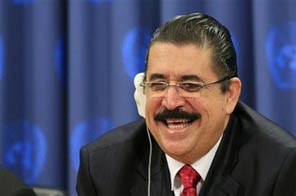Zelaya, coup leader set to meet
SAN JOSE: After days of protests triggered by an army-backed coup in Honduras, deposed President Manuel Zelaya was preparing to meet the country's interim leader for the first time since his ouster.
Zelaya and interim leader Roberto Micheletti are Thursday due to start two days of talks to be mediated by Costa Rican President Oscar Arias, a Nobel Peace prize winner, at his home in San Jose.
"It seems to me that there is willingness on both sides to seek a negotiated settlement through diplomacy, through dialogue," Arias said.
The United States has been a prime mover in trying to resolve the political impasse triggered when Honduran troops, backed by a court order, roused Zelaya from his bed on June 28 and whisked him out of the country.
The coup -- the first in years in Latin America -- triggered global alarm and the 34-member Organization of American States expelled Honduras from its regional grouping.
US Secretary of State Hillary Clinton has backed the Costa Rican mediation bid after meeting with Zelaya in Washington, but stopped short of demanding he be reinstated as urged by the White House.
"There needs to be a specific mediator and, to that end, we are supporting the efforts of President Arias of Costa Rica to serve in this important role," Clinton told reporters.
Clinton also said Zelaya had agreed to negotiations without preconditions on his future role.
When asked if she backed his return, Clinton said she hoped for "a return of democratic, constitutional order that is agreed to by all concerned."
As they prepared for their talks though, both Zelaya and Micheletti -- sworn in by Congress just hours after the coup -- insisted they were not planning to hold negotiations.
"We're not going to negotiate, we're going to talk," Micheletti told a news conference.
Zelaya said the meeting was not to negotiate, but to plan "the exit of the coup leaders."
But Zelaya said he would agree to advance elections due in November if he was returned to power.
The Honduran interim leaders insist they took power in a "constitutional succession," not a coup, and accuse Zelaya of a string of crimes, including corruption and failing to implement laws.
But on Tuesday they hinted for the first time at a possible exit to the crisis, as a Supreme Court spokesman said Zelaya could return if Congress grants him amnesty.
Zelaya had tried to return on Sunday, but the army prevented his plane from landing in the capital Tegucigalpa during violent protests in which two people were killed.
The airport was set to re-open Wednesday for the first time since Zelaya's attempted return, but a curfew was still in place.
A spokesman for the UN High Commissioner for Human Rights condemned "excessive force" by authorities quelling the protests.
International pressure on the Central American nation also includes a freeze on aid, the recalling of ambassadors and temporary trade embargoes.
Venezuelan President Hugo Chavez, Zelaya's key backer, said he has suspended shipments of oil, while the United States has placed all military activities with Honduras on hold until further notice.
Night curfews -- which suspend some freedoms guaranteed by the constitution -- and media blackouts continue to heighten tensions in one of Latin America's poorest countries.






